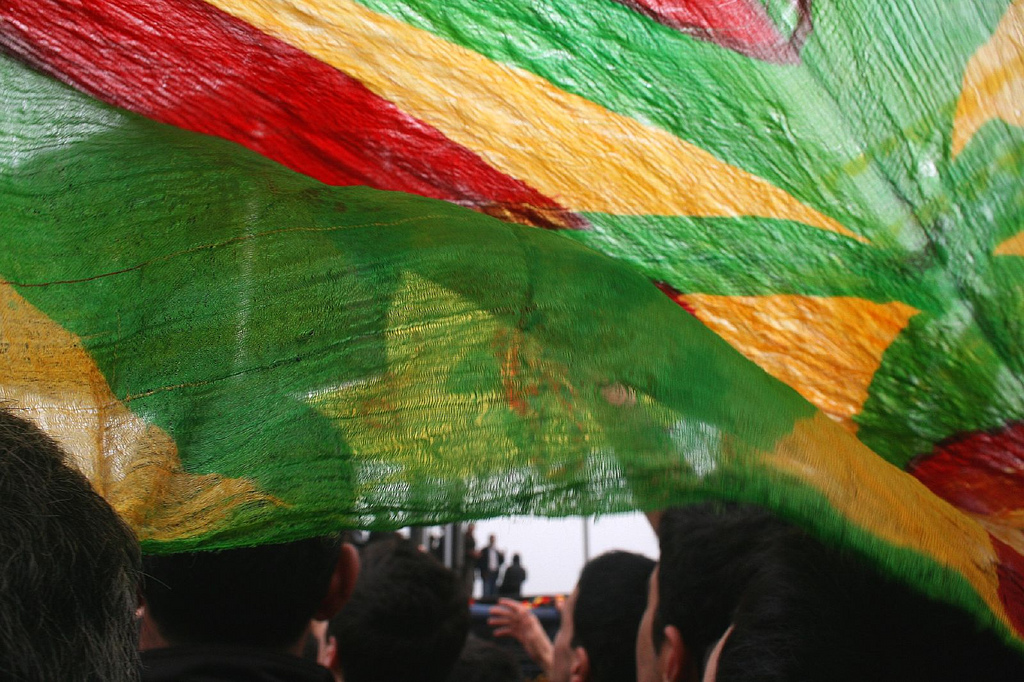5 Ways the Turkish State is Attacking Kurds
by Libsoc Blogs
17 March 2016

Since 2015, the Turkish state has been waging a war against numerous Kurdish factions. It is estimated that nearly 200 civilians have been killed in Turkish offensives against Kurdish communities. This has occurred despite the fact that Kurdish organisations such as the YPG have been the most effective in the fight against Isis in Syria. Furthermore, despite a popular campaign for it to be delisted, the Turkish-based left-wing organisation, the Kurdistan Workers’ Party (PKK), has been proscribed by many countries including the UK. This has led some to condemn the Turkish state’s war against Kurds and question its commitment to defeating Isis.
1. Refusing to negotiate with Kurds.
Since taking power in 2002, the right-wing Justice and Development Party (AKP), led by Recep Erdoğan, has ruled over Turkey with an aggressive blend of free market capitalism, Islamism and nationalism. As such, when the Rojava revolution saw Kurds create a democratic and socialist project in the Kurdish-held regions of Syria (Western Kurdistan), the AKP urged Turkish Kurds not to support the Rojava experiment. In 2012, the AKP finally answered calls for negotiations with Kurdish groups, but it showed little to no commitment to the negotiations, refused to take significant steps to restore piece, and continued to build military outposts in Kurdish communities. Finally, with the rise of Isis, the Turkish regime broke off its peace talks in mid-2015.
2. Blockading Kurdish communities.
Due to a Turkish embargo, Kurdish-held areas have major problems receiving access to water, electricity and health care. Not only does the Turkish state refuse to provide these necessities to Kurds, but it also refuses to take any Kurdish patients except those injured in fighting. While community projects have been set up in Kurdish communities to provide these services, it is undeniable that the Turkish state is denying Kurds access to basic human rights.
3. Leaving Kurds to Isis.
When Isis carried out an assault on the Syrian border town of Kobani in 2014, the Turkish military was reluctant to do anything but sit and watch from the other side of the national boundary. When Kurds held protests against Turkey’s inaction, a dozen protesters were killed by police. In spite of rising tension in the Kurdish community, they still maintained their commitment to negotiate with the Turkish state.
When Isis carried out a bombing in Suruç (a Turkish border town near Kobani), the co-chair of the pro-Kurdish Peoples’ Democratic Party (HDP) suggested deep state organisations linked to Erdoğan had designed the attack. As a result of this, many Kurds in Turkey began to think they could not trust the Turkish state to protect them.
4. Launching airstrikes against Kurds.
When Turkey finally promised the west it would fight against Isis, the first thing it did was to launch airstrikes against Kurdish positions in northern Iraq, showing complete disregard for international law. The forces of the YPG, which had been the most effective forces in the battle against Isis, were now being attacked by the same people they had long desired a peace process with.
While all this was going on, Turkish media repeatedly referred to the Kurds as terrorists who only seek to interfere in the ‘peace processes’. Ultimately, it is the Turkish state which has been responsible for civil war breaking out in Turkey.
5. The assault against academics.
In response to the Turkish state’s war against the Kurds, the government received a letter calling for peace negations with Kurds, and demanding an end to ‘violence perpetrated by the state’. The declaration was been signed by 1,128 different academics, including the public intellectual Noam Chomsky among them, and over 100 journalists.
So how did the Turkish state respond to this call for peace? Erdoğan responded by saying: “I give you the name of an American terrorist…Chomsky, the criminal.”
In light of this, the Turkish government was suspected of orchestrating a counter declaration, in support of the state’s war on the Kurds. Additionally, Turkish police detained 27 of the pro-Kurdish academics over alleged ‘terror propaganda’. This has not only resulted in further criticism of the AKP, but has also forced many academics to go into hiding. [As of yesterday, Erdoğan has proposed broadening the definition of ‘terrorism’ to include perceived supporters, including academics, politicians and journalists.]
Photo: Isa Fakir/Flickr
–
If you want to support media for a different politics, you can donate or subscribe to Novara Media at support.novaramedia.com.